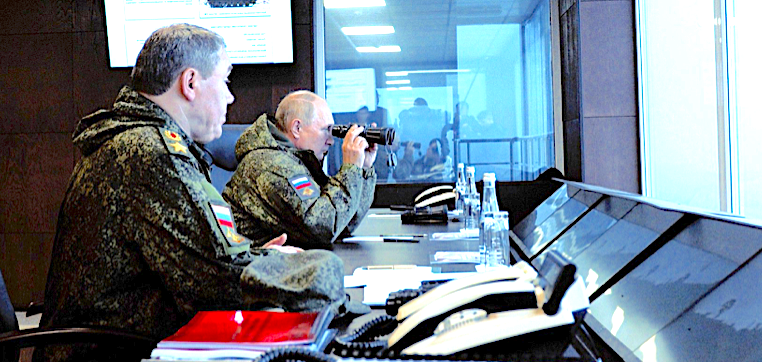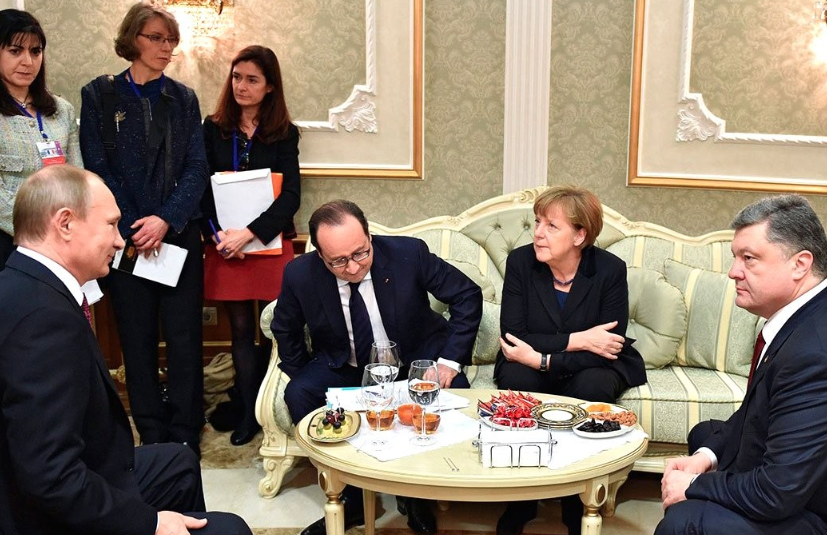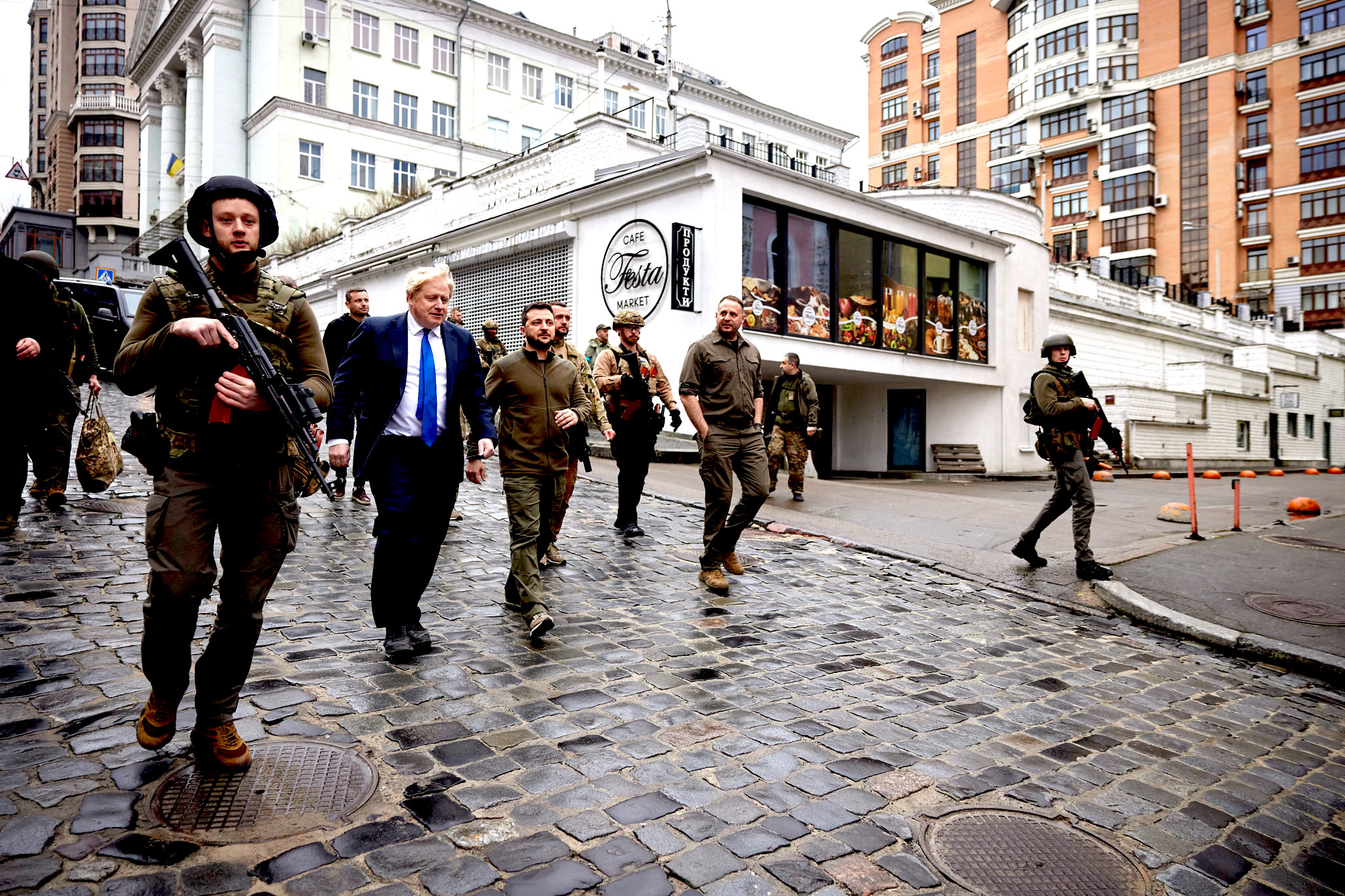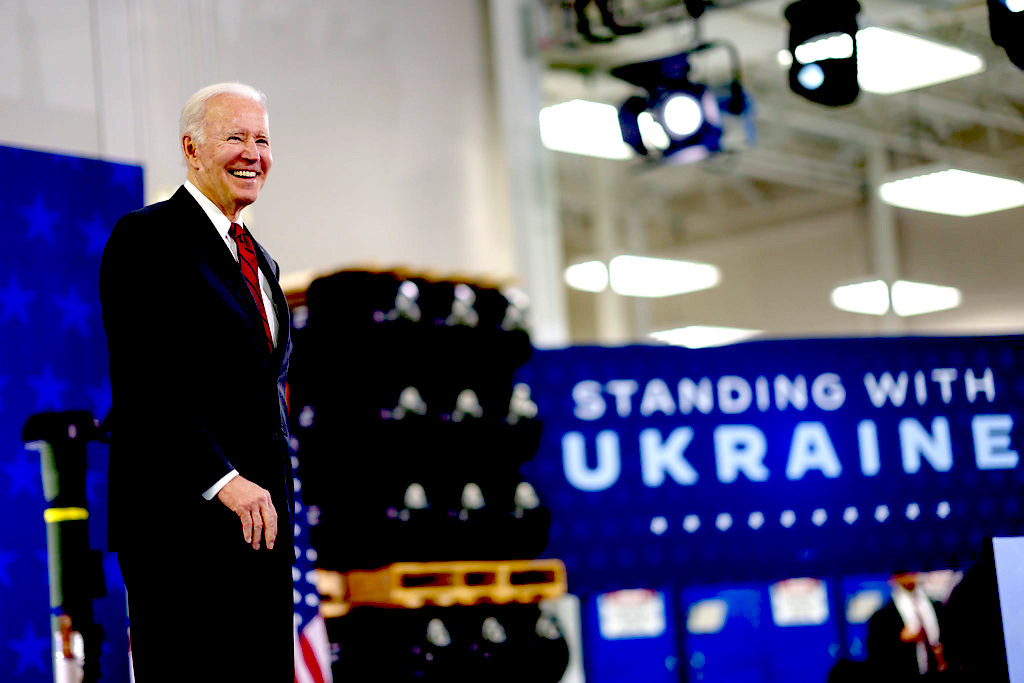SCOTT RITTER: 2023 Outlook for Ukraine
Given the duplicitous history of the Minsk Accords, it is unlikely Russia can be diplomatically dissuaded from its military offensive. As such, 2023 appears to be shaping up as a year of continued violent confrontation.

Russian President Vladimir Putin observing military exercises in the eastern Primorsky Krai region, September 2022. (Kremlin)
By Scott Ritter
Special to Consortium News
 After almost a year of dramatic action, where initial Russian advances were met with impressive Ukrainian counteroffensives, the frontlines in the ongoing Russian-Ukrainian conflict have stabilized, with both sides engaged in bloody positional warfare, grinding each other down in a brutal attritional contest while awaiting the next major initiative from either side.
After almost a year of dramatic action, where initial Russian advances were met with impressive Ukrainian counteroffensives, the frontlines in the ongoing Russian-Ukrainian conflict have stabilized, with both sides engaged in bloody positional warfare, grinding each other down in a brutal attritional contest while awaiting the next major initiative from either side.
As the one-year anniversary of Russia’s invasion of Ukraine approaches, the fact that Ukraine has made it this far into the conflict represents both a moral and, to a lesser extent, a military victory.
From the chairman of the U.S. Joint Chiefs of Staff to the director of the C.I.A., most senior military and intelligence officials in the West assessed in early 2022 that a major Russian military offensive against Ukraine would result in a rapid, decisive Russian victory.
The resilience and fortitude of the Ukrainian military surprised everyone, including the Russians, whose initial plan of action, inclusive of forces allocated to the task, proved inadequate to the tasks assigned. This perception of a Ukrainian victory, however, is misleading.
The Death of Diplomacy
As the dust settles on the battlefield, a pattern has emerged regarding the strategic vision behind Russia’s decision to invade Ukraine. While the mainstream Western narrative continues to paint the Russian action as a precipitous act of unprovoked aggression, a pattern of facts has emerged which suggests that the Russian case for preemptive collective self-defense under Article 51 of the United Nations Charter may have merit.
Recent admissions on the part of the officials responsible for the adoption of the Minsk Accords of both 2014 and 2015 (former Ukrainian President Petro Poroshenko, former French President Francois Hollande and former German Chancellor Angela Merkel) show that the goal of the Minsk agreements for the promotion of a peaceful resolution to the post-2014 conflict in the Donbass between the Ukrainian government and pro-Russian separatists was a lie.

Feb. 12, 2015: Russian President Vladimir Putin, French President Francois Hollande, German Chancellor Angela Merke, Ukrainian President Petro Poroshenko at the Normandy format talks in Minsk, Belarus. (Kremlin)
Instead, the Minsk Accords, according to this troika, were little more than a means to buy Ukraine time to build a military, with the assistance of NATO, capable of bringing the Donbass to heel and driving Russia out of Crimea.
Seen in this light, the establishment of a permanent training facility by the U.S. and NATO in western Ukraine — which between 2015 and 2022 trained some 30,000 Ukrainian troops to NATO standards for the sole purpose of confronting Russia in eastern Ukraine — takes on a whole new perspective.
The admitted duplicity of Ukraine, France and Germany contrasts with Russia’s repeated insistence prior to its Feb. 24, 2022, decision to invade Ukraine that the Minsk Accords be implemented in full.
Support CN’s
Winter Fund Drive!
In 2008, former U.S. Ambassador to Russia William Burns, the current C.I.A. director,warned that any effort by NATO to bring Ukraine into its fold would be viewed by Russia as a threat to its national security and, if pursued, would provoke a Russian military intervention. That memo by Burns provides much-needed context to the Dec. 17, 2021, initiatives by Russia to create a new European security framework that would keep Ukraine out of NATO.
Simply put, the trajectory of Russian diplomacy was conflict avoidance. The same cannot be said of either Ukraine or its Western partners, who were pursuing a policy of NATO expansion linked to the resolution of the Donbass/Crimea crises through military means.
Game Changer, Not Game Winner
The reaction of the Russian government to the failure on the part of the Russian military to defeat Ukraine in the opening phases of the conflict provides important insight into the mindset of the Russian leadership regarding its goals and objectives.
Denied a decisive victory, the Russians seemed prepared to accept an outcome which limited Russian territorial gains to the Donbass and Crimea and an agreement by Ukraine not to join NATO. Indeed, Russia and Ukraine were on the cusp of formalizing an agreement along these lines in negotiations scheduled to take place in Istanbul in early April 2022.
This negotiation, however, was scuttled following the intervention of then British Prime Minister Boris Johnson, who linked the continued provision of military assistance to Ukraine to the willingness of Ukraine to force a conclusion to the conflict on the battlefield, as opposed to negotiations. Johnson’s intervention was motivated by an assessment on the part of NATO that the initial Russian military failures were indicative of Russian weakness.

April 9, 2022: Ukrainian President Volodymyr Zelensky takes U.K. Prime Minister on walk around Kiev. (President of Ukraine, Public domain)
The mood in NATO, reflected in the public statements of NATO Secretary General Jens Stoltenberg(“If [Russian President Vladimir] Putin wins, that is not only a big defeat for the Ukrainians, but it will be the defeat, and dangerous, for all of us”) and U.S. Secretary of Defense Lloyd Austin (“We want to see Russia weakened to the degree that it can’t do the kinds of things that it has done in invading Ukraine”) was to use the Russian-Ukrainian conflict as a proxy war designed to weaken Russia to the point that it would never again seek to undertake a Ukraine-like military adventure. [Coupled with an ill-fated economic war, it was also designed to bring down the Russian government, as President Joe Biden admitted last spring.]
This policy served as the impetus for the injection of what would amount to well over $100 billion worth of assistance, including tens of billions of dollars of advanced military equipment, to Ukraine.
This massive infusion of aid was a game-changing event, allowing Ukraine to transition from a primarily defensive posture to one that saw a reconstituted Ukrainian military, trained, equipped and organized to NATO standards, launching large-scale counterattacks that succeeded in driving Russian forces from large swaths of Ukraine. It was not, however, a game winning strategy — far from it.
Military Math
The impressive Ukrainian military accomplishments that were facilitated through the provision of military aid by NATO came at a huge cost in lives and material. While the exact calculation of casualties suffered by either side is difficult to come by, there is widespread acknowledgement, even among the Ukrainian government, that Ukrainian losses have been heavy.
With the battle-lines currently stabilized, the question of where the war goes from here comes down to basic military math — in short, a causal relationship between two basic equations revolving around burn rates (how quickly losses are sustained) versus replenishment rates (how quickly such losses can be replaced.) The calculus bodes ill for Ukraine.
Neither NATO nor the United States appear able to sustain the quantity of weapons that have been delivered to Ukraine, which enabled the successful fall counteroffensives against the Russians.
This equipment has largely been destroyed, and despite Ukraine’s insistence on its need for more tanks, armored fighting vehicles, artillery and air defense, and while new military aid appears to be forthcoming, it will be late to the battle and in insufficient quantities to have a game-winning impact on the battlefield.
Likewise, the casualty rates sustained by Ukraine, which at times reach more than 1,000 men per day, far exceed its ability to mobilize and train replacements.

President Joe Biden delivering “stand with Ukraine” remarks on May 3, 2022, at the Lockheed Martin facility in Troy, Alabama. (White House, Adam Schultz)
Russia, on the other hand, is in the process of finalizing a mobilization of more than 300,000 men who appear to be equipped with the most advanced weapons systems in the Russian arsenal.
When these forces arrive in full on the battlefield, sometime by the end of January, Ukraine will have no response. This harsh reality, when coupled with the annexation by Russia of more than 20 percent of Ukraine’s territory and infrastructure damage approaching $1 trillion, bodes ill for the future of Ukraine.
There is an old Russian saying, “A Russian harnesses slowly but rides fast.” This appears to be what is transpiring regarding the Russian-Ukraine conflict.
Both Ukraine and its Western partners are struggling to sustain the conflict they initiated when they rejected a possible peace settlement in April 2022. Russia, after starting off on its back feet, has largely regrouped, and appears poised to resume large-scale offensive operations which neither Ukraine nor its Western partners have an adequate answer for.
Moreover, given the duplicitous history of the Minsk Accords, it is unlikely Russia can be dissuaded from undertaking its military offensive through diplomacy. As such, 2023 appears to be shaping up as a year of continued violent confrontation leading to a decisive Russian military victory.
How Russia leverages such a military victory into a sustainable political settlement that manifests itself in regional peace and security is yet to be seen.
Scott Ritter is a former U.S. Marine Corps intelligence officer who served in the former Soviet Union implementing arms control treaties, in the Persian Gulf during Operation Desert Storm and in Iraq overseeing the disarmament of WMD. His most recent book is Disarmament in the Time of Perestroika, published by Clarity Press.
https://consortiumnews.com/2023/01/11/scott-ritter-2023-outlook-for-ukraine/



Geen opmerkingen:
Een reactie posten